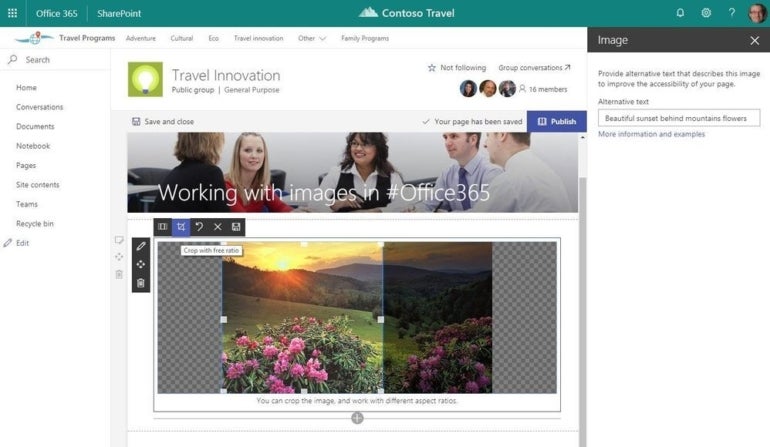-
PandaDoc: Best for eSignatures
-
SharePoint: Best for Microsoft users
-
Hightail: Best for sending photos and videos
-
Revver: Best for document workflows
-
DocuWare: Best for on-premise deployment
-
M-Files: Best for automations
-
Coda: Best for knowledge management
-
OnlyOffice: Best office productivity suite
The right document management software makes it a snap to manage a content library, collaborate on files, gather eSignatures and digitize print documents. We’ve rounded up the best document management software for businesses of all sizes, from startups to enterprises.
Jump to:
- Top document management software comparison
- Top document management software
- Key features of document management software
- How do I choose the best document management software for my business?
Top document management systems comparison
Besides pricing, there are many other features that you should consider when choosing a document management solution:
| Templates | OCR document scanning | Real-time editing collaboration | Forever free plan available | Starting price | |
|---|---|---|---|---|---|
| PandaDoc | Yes | Yes | Yes | No | $19 per person per month |
| SharePoint | Yes | Yes | Yes | No | $5 per user per month |
| Hightail | No | No | Yes | Yes | $12 per person per month |
| Revver | Yes | Yes | Yes | No | Contact for pricing |
| DocuWare | No | Yes | Yes | No | Contact for pricing |
| M-Files | Yes | Yes | Yes | No | Contact for pricing |
| Coda | Yes | No | Yes | Yes | $10 per person per month |
| OnlyOffice | Yes | Requires plug-in | Yes | Yes | $15 per person per month |
PandaDoc: Best for eSignatures
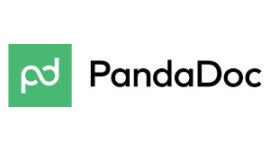
Thanks to easy eSignature capabilities, PandaDoc is an excellent solution for proposals, quotes and contract management (Figure A). It offers an impressive library of over 1,000 document templates to choose from, and the drag-and-drop interface makes it easy to edit them. Real-time notifications for when documents have been opened, viewed and signed ensure that no document ever falls through the cracks.
Figure A
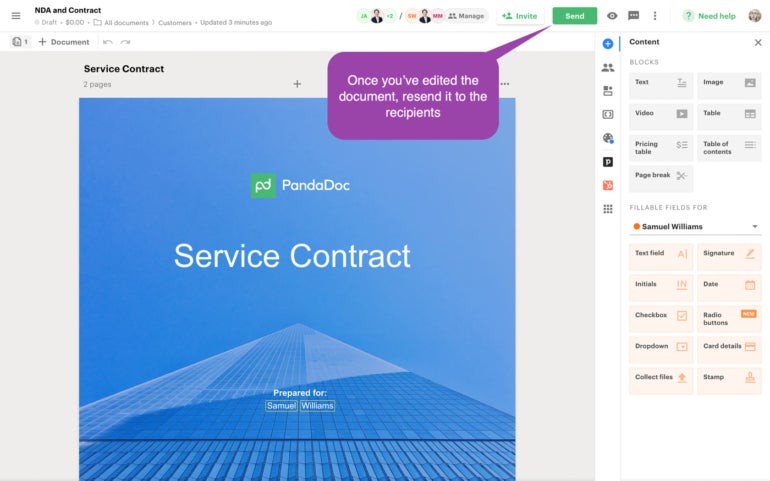
Pricing
- Essentials: $19 per person per month billed annually or $35 per person per month billed monthly
- Business: $49 per person per month billed annually or $65 per person per month billed monthly.
- Enterprise: Contact the sales team for a custom quote.
Features
- Choose from 1,000+ document templates.
- Pull customer data into documents with CRM integrations.
- Get real-time notifications for when documents have been opened, viewed and signed.
- Optional content locking prevents edits from being made.
Pros
- Transparent pricing plans.
- 14-day free trial available.
- Easy-to-use interface.
- Drag-and-drop editing is fast to use.
Cons
- Maximum of two users on the Essentials plan.
- Must upgrade to business plan for content library and approval workflow features.
- Monthly plans up to 46% more expensive than annual plans.
- Some features limited to add-ons.
Hightail: Best for sending photos and videos
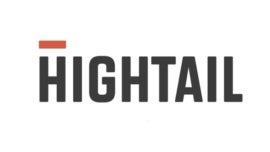
While Hightail can be used for text documents, it really shines with visual media like photos and videos. If you have been struggling to send and proof these types of files via email, Hightail will make it a breeze thanks to its large file upload limits. Unlike other document management software that obscure their costs, Hightail is also totally upfront about its pricing plans — and it offers a forever free plan for light use. This makes Hightail an excellent choice for small businesses on a budget who are looking for a document management solution that won’t cost them too much.
Pricing
- Lite: Free forever for files up to 100MB file uploads and 2GB storage.
- Pro: $12 per person per month billed annually for up to 25GB file upload and unlimited storage.
- Teams: $25 per person per month billed annually for up to 50GB file upload and unlimited storage. Supports 1-30 users.
- Business: $36 per person per month billed annually for up to 500GB file upload and unlimited storage. Minimum of 3 users required. Free trial available.
Features
- Preview files with side-by-side comparison.
- Option to request delivery receipt.
- Visually appealing and intuitive layout (Figure C).
- Basic project management software included.
Figure C

Pros
- Forever free plan available.
- Transparent and affordable pricing plans.
- Excellent option for photo and video files.
- Easy to send and receive large files.
Cons
- Some users don’t like the black background.
- Not suitable for complex document management.
- Site can sometimes glitch.
- Features aren’t as robust as some other competitors.
Revver: Best for document workflows

Earlier this year, eFileCabinet and Rubex rebranded as a single document management tool called Revver. Revver automates document-dependent work with its no-code document workflow management (Figure D). This tool makes it easy to create very specific and granular document workflows, even if you don’t have any coding experience whatsoever. It also offers other cool features, such as the ability to scan and import searchable documents with OCR (optical character recognition) technology.
Figure D
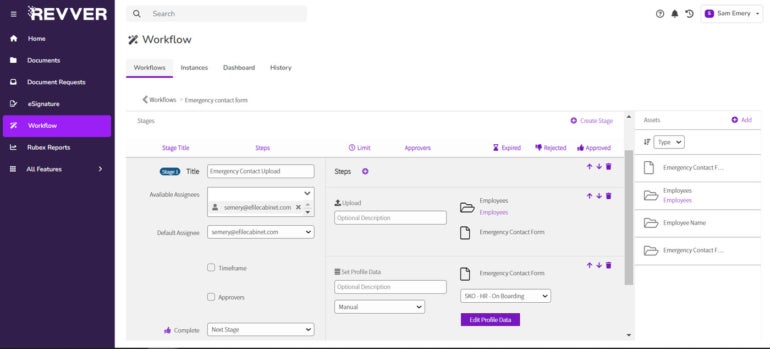
Pricing
Revver doesn’t disclose pricing on its website; you must contact the sales team for a custom quote.
Features
- No-code document workflow automation.
- Lots of storage capacity.
- Good search functionality.
- Scan and import files with OCR technology.
Pros
- Desktop application has been completely updated.
- Excellent Microsoft 365 integration.
- Uneditable audit trails.
- Assign roles and permissions to different users
Cons
- Pricing is not transparent.
- Free trial not available.
- Mobile app not yet rolled out.
- Set-up can take a long time.
DocuWare: Best for on-premise deployment

DocuWare offers both cloud-based and on-premise deployment so that companies can choose the document software that works best for their needs. While the name might not indicate it, DocuWare also offers many additional tools besides document management (Figure E), including tools for invoice processing and employee management. Businesses of all sizes can use DocuWare, though some small businesses may find the number of features overwhelming.
Figure E
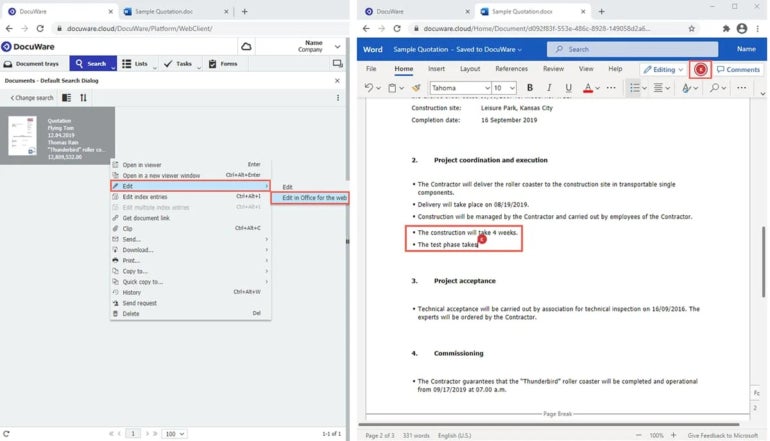
Pricing
DocuWare doesn’t disclose pricing on its website; you must contact the sales team for a custom quote.
Features
- Secure, centralized document storage platform.
- Classify documents and index information with just a few clicks.
- Create workflows for automatic approvals.
- Set access authorizations to ensure confidentiality.
Pros
- Free 30-day trial available.
- Includes tools for invoice processing and employee management.
- On-premise deployment option available.
- Large knowledge base.
Cons
- Pricing is not transparent.
- Mobile app could be improved.
- Setting up workflows and permissions can be complicated.
- No reporting tools available.
M-Files: Best for automations
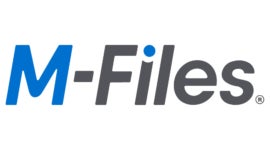
M-files automated workflows speed up document management for the entire team. Artificial intelligence (AI) scans to trigger workflows and set permissions automatically, reducing manual work. With M-Files, your team can model current processes with a flowchart, then give access to the right people with permission controls. OCR capabilities make it easy to scan and digitize physical documents.
Pricing
M-Files doesn’t disclose pricing on its website; you must contact the sales team for a custom quote.
Features
- Authorizing features for sending invites.
- OCR document scanning available.
- Excellent document search feature.
- Automatic reminders for documents.
Pros
- Advanced security features.
- Well-organized file categorization system (Figure F).
- Good mobile app.
- Offline access available.
Figure F
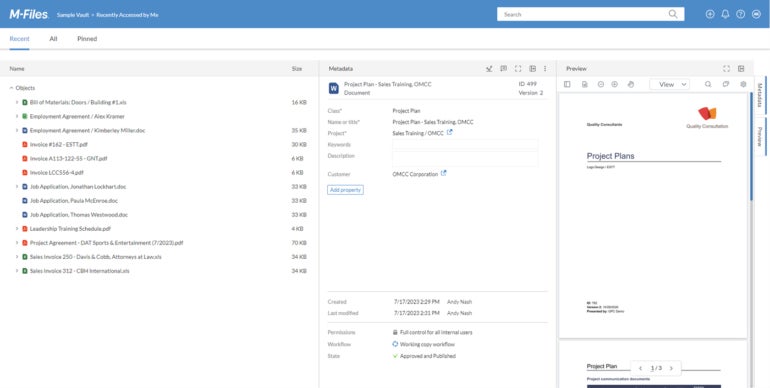
Cons
- User interface could be improved.
- Difficult to navigate.
- High learning curve for beginners.
- Workflows can be complicated to set up.
Coda: Best for knowledge management
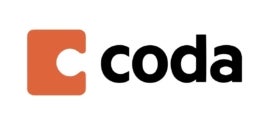
Coda.io is a digital collaboration tool that offers tools for document management. While teams can collaborate on many different types of content, where Coda really excels is knowledge management (Figure G). Teams can build and manage their own visually appealing wikis directly in the tool. Templates make it easy to start with a foundation, while interactive building blocks make the content more engaging.
Figure G
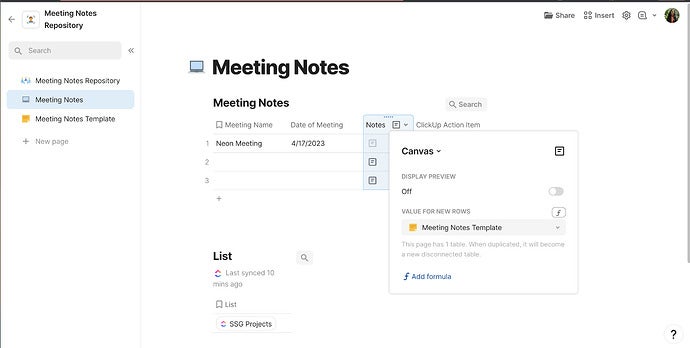
Pricing
- Free: No cost for unlimited users and unshared documents.
- Pro: $10 per Doc Maker per month billed annually, or $12 per Doc Maker per month billed monthly.
- Team: $30 per user per Doc Maker billed annually, or $36 per Doc Maker per month billed monthly.
- Enterprise: Contact sales for a pricing quote.
Features
- No-code workflow automations.
- Formula editor for calculations.
- Choose from many content templates.
- Flexible pages with many types of content blocks.
Pros
- Gantt charts and Kanban boards included.
- Only pay for active document makers, not passive viewers.
- More than 1,000 integration available.
- Good free plan.
Cons
- No desktop apps available.
- Only 50 objects per page on the free plan.
- Must upgrade to Team plan for unlimited automations and version history.
- Salesforce and Hubspot integration “packs” limited to Enterprise plan.
For more information, read the full Coda.io review.
OnlyOffice: Best office productivity suite

OnlyOffice is an office productivity suite that includes simple document management (Figure H) as part of its features. OnlyOffice isn’t the most robust document management solution out there, but it will suffice for many small and medium size businesses who need a more advanced alternative to Google Docs. It also offers the option to purchase a license for on-premise deployment.
Figure H
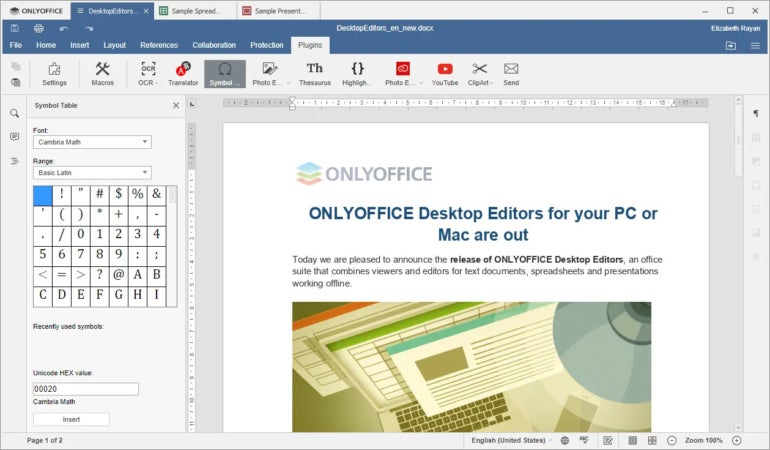
Pricing
- DocSpace
- Startup Cloud: Free for a limited time
- Business Cloud: $15 per person per month
- Enterprise On-Premise: $6,550 per server per lifetime
- Docs Cloud
- Business: $8 per user per month
- VIP: Contact for a pricing quote
- Docs On-Premise
- Home server: $149 one-time payment for personal use
- Enterprise: from $1,500 for a lifetime license
- Workspace Enterprise
- Enterprise: $2,200 for a lifetime license
- Enterprise Plus: $3,300 lifetime license
- Enterprise Premium: $4,450 lifetime license
Features
- Choose from real-time or paragraph-locking collaboration.
- Built-in chat messages feature for documents.
- ChatGPT plug-in included.
- Both desktops and mobile apps available.
Pros
- Many different on-premise deployment licensing options.
- Good alternative to Google Docs and Drive.
- End-to-end encrypted private rooms coming soon.
- Free cloud plan for schools and nonprofits.
Cons
- Many different pricing plans are confusing to navigate.
- Software can glitch sometimes.
- Could use more integrations.
- Difficult to set up.
Key features of document management software
Templates
Creating a document from scratch each time is tedious and time consuming, which is why the best document management software comes with numerous preloaded templates. The software should also make it easy to create a document, personalize it to your company’s exact needs and then save it as a unique custom template.
File sharing and permissions
Document management software should make it simple to share a file with people both inside and outside the organization for feedback, collaboration and approvals. Document management software should also let document editors set permissions for each person so that they can determine whether they are read-only or have edit access.
Real-time collaboration
Not all document management software creates a seamless experience when multiple people are editing a document at the same time. If your team often collaborates in real-time, then test out the software to see if it glitches or doesn’t save changes when multiple people are working on it at once.
Scanning and categorization
More and more document management software is now including optical character recognition (OCR) technology that scans and digitizes print documents. Some are also including machine learning and artificial intelligence technology that can automatically tag and organize documents to cut down on manual work.
Security
Pretty much every company needs to safely store documents that contain sensitive information like bank information and Social Security Numbers. The best document management software will provide robust security protocols to protect your documents from both accidental leaks and intentional hackers.
How do I choose the best document management software for my business?
When choosing a document management software, consider your main use cases for the software: Are you looking to get contract eSignatures from clients? Are your teams collaborating on the same document at the same time? Do you need large file limits to send photos and videos? Do you need to securely store documents full of sensitive information? Are you looking to scan and digitize many PDF documents? Do you need other features, like enterprise project management or resource management? Narrowing down your exact needs will help you decide on the best document management software for your needs.
Another factor to consider is whether you want a cloud-based platform or an on-premise deployment. Pricing varies widely for document management software, so be sure to get accurate quotes from all of your top options and compare them closely. Do take advantage of free trials and demo calls so that you fully understand the capabilities and limitations of the software before signing an annual contract.
Methodology
To choose the best document management software, we consulted user reviews and product documentation. We considered factors such as the pricing, user interface design, learning curve and customer support. We also consider features such as document templates, file sharing, user permissions, real-time editing, document scanning and security protocols.



